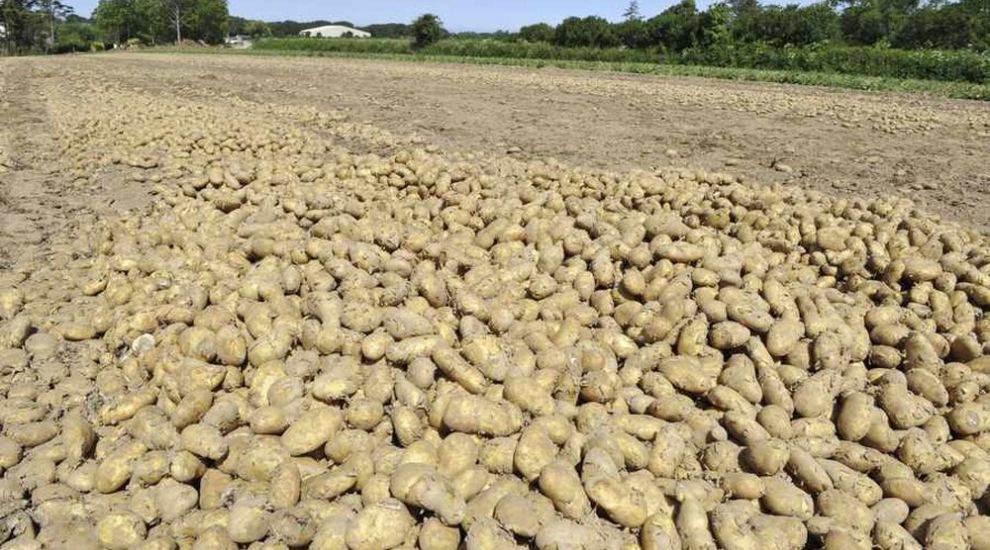

Concerns about “acres and acres” of "wasted" potatoes being ditched in fields have been circulating on social media...but what has caused the mass dumping of dud spuds?
The sight of hundreds of discarded Jersey Royals has prompted many to blast the dumping as wasteful, with one environmental campaigner expressing her frustration at the annual practice, which comes as the season draws to a close.
Voicing similar concerns to many other commenters making their feelings known on social media, Sheena Brockie of the Good Jersey Life - a blog promoting an greener way of life - told Express that seeing these discarded potatoes disappoints her.
“In these times of climate emergency, I am so frustrated that this continues to be an acceptable practice," she explained.
"According to the United Nations Food and Agriculture Organisation, one third of all food produced for human consumption in the world is lost or wasted, and clearly Jersey is playing its part in this damming statistic."

Pictured: Environmental campaigner Sheena Brockie says she is "frustrated" by the practice.
The campaigner continued: “The whole lifecycle of growing Jersey Royals has an impact on our climate, land, water and biodiversity. This food wastage is a real missed opportunity for the island to improve local food security, but also to mitigate environmental impacts and resources used in food production.
“If you take account the manpower, water, energy, farming machinery costs and, no doubt, chemicals that have been consumed in the process of growing Royals – every single edible potato should be released for consumption to mitigate the use of these limited resources – whatever their shape or size.”
The issue drew attention on Facebook after an islander posting an image of one such field full of discarded potatoes garnered several critical responses.
One commenter said: “Why don’t the farmers just say come and help yourself to rejected potatoes- bring your own bags- they’d get rid of a good few this way!”

Pictured: The discarded potatoes have garnered criticism on social media.
But potato farmers and packers say that they “don’t really have much choice” in the matter.
Express found out why growers are resorting to dumping potatoes back on the land as the season draws to an end from Jersey Farmers’ Union President Peter Le Maistre.
He says the practice has resulted from some major changes in the industry including the States decision not to take agricultural waste at La Collette.
“The States decided when they moved all their waste facilities down to La Collette that they were going to take green waste but they weren’t going to take agricultural waste and they told growers to find other ways of disposing of it.”
Lots of the waste, Mr Le Maistre explained, can be given to cattle for food but this is not possible with potatoes as cows find them difficult to digest.
The other change which has led to the practice of returning potatoes which aren’t sold to the soil is the rise of a potato packing infrastructure in the island.

Pictured: Changes in the industry has led to the practice of dumping dud spuds back into the fields ahead of the next season.
Jersey has two packing houses – the Jersey Royal Company (JRC) and Albert Bartlett – who pack up washed potatoes which are then exported to supermarkets in the UK to be sold.
Mr Le Maistre said that although this has “huge advantages in the marketplace because it means that we can get potatoes to market much more quickly” it also has the disadvantage of keeping all the waste on island rather than exporting it for the pack houses elsewhere to deal with.
There are also stricter rules about which potatoes can be pre-packed because any damage to the spuds will result in an accelerated bacterial growth within the contained atmosphere of the packed potatoes. So, the stringent criteria determining which spuds make the cut are also in place to increase the produce’s shelf-life.
He continued: “The best practice which has been agreed with government and with audit bodies in the UK is that growers should put it back on the land in – I know it looks a lot – but it’s actually in pretty small quantities.”
The potatoes are therefore left in the field to dry out before being turned back into the ground.
However, the JFU President urged that the industry are finding ways to cut down on their waste including shipping off some of the larger Royals which don’t have a market locally or in the UK elsewhere in Europe to be sold on.
Pictured top: Hundreds of discarded Jersey Royals. (Facebook/Steve Clayton).
Comments
Comments on this story express the views of the commentator only, not Bailiwick Publishing. We are unable to guarantee the accuracy of any of those comments.